Michelle Yeoh Hopes 'Crazy Rich Asians' Will Bring A Bold Change In Hollywood
The iconic actress opens up about early script changes and finding her character's quiet strength
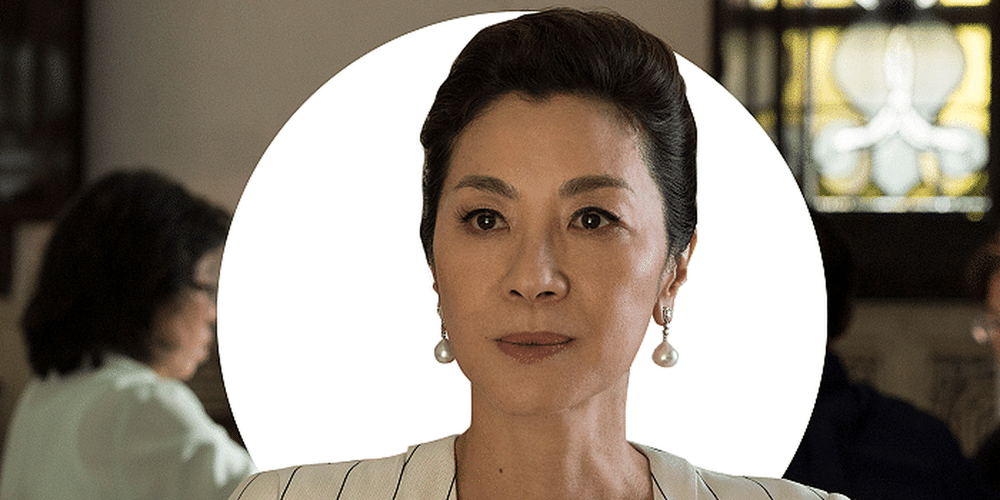
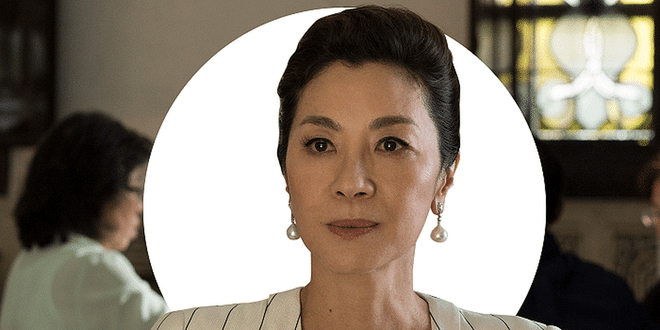
Photo: Warner Bros.
Crazy Rich Asians
On the surface, Crazy Rich Asians' Eleanor Young is a formidable opponent. The wife of one of Singapore’s biggest developers, she’s wealthy, poised, powerful, protective, and relentlessly disapproving of her only son Nick’s (Henry Golding) new girlfriend, Chinese-American Rachel Chu (Constance Wu). She never raises her voice, but she could make you sweat with a single glare. She’s a girlfriend’s worst nightmare, Cinderella’s evil stepmom in a chiffon dress, the Miranda Priestly of Singapore.
But to an Asian-American viewer, she’s also a reflection of our own mothers, aunties, grandmothers, and in-laws. It shows in the way she offers her son food the moment he arrives home, the way she tends to her elderly mother-in-law despite their fraught relationship, and the way she upholds the tradition of making dumplings with relatives at the dinner table.
Eleanor is not just an antagonist. She’s a lens that magnifies important themes in Asian culture: the importance of family, respect for one’s roots and culture, parents making sacrifices for their children, reverence for tradition and the elderly, and, perhaps most importantly, how matriarchs ground their families.
Related article: Michelle Yeoh Opens Up About 'Crazy Rich Asians'
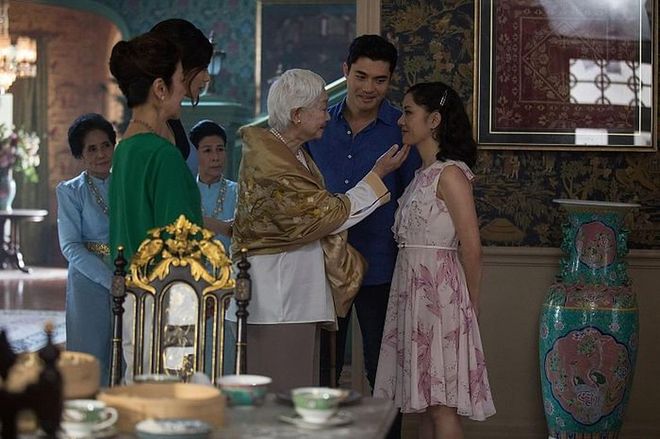
Eleanor (Yeoh), Astrid (Gemma Chan), Ah Ma (Lisa Lu), Nick (Henry Golding), and Rachel (Constance Wu). Photo: Warner Bros.
Crazy Rich Asians
The only father figures in Crazy Rich Asians, Ken Jeong’s Goh Wye Mun and Ronny Chieng’s Eddie Cheng, provide comic relief. It's mostly the women and mothers who hold the power and shape the narratives for themselves and their families. In addition to Eleanor, there’s Nick’s grandmother Su Yi, who’s the head of the family; Nick’s cousin Astrid, who leaves a failing marriage upon discovering her self-worth; Rachel’s mother Kerry Chu, who emigrated from China to raise her daughter as a single mom; and, ultimately, Rachel, whose decision to sacrifice her love for Nick finally earns her Eleanor’s acceptance.
Michelle Yeoh, the Malaysian actress who plays Eleanor Young, is nothing like her character. She’s animated when she speaks—no ice-cold stares here. But as she sits across the table from me, dressed in a periwinkle Ermanno Scervino lace dress and cobalt peep-toe pumps, legs crossed, with a floral ring half the size of her finger arranged on her right hand, I realize the one thing she shares with her onscreen persona is an inherent elegance.
Yeoh, 56, has played many powerful women in her 30-plus-year career, which includes roles as a Bond girl, Burmese democratic leader Aung San Suu Kyi, and a sword-wielding fighter in Crouching Tiger, Hidden Dragon. Eleanor Young, the latest addition to her resume, possesses a different kind of strength. It’s silent and reserved, but it’s obvious as soon as she appears on-camera. “What I tried to create is when she walks in a room, or when she's sitting there, you feel her. She's palpable,” Yeoh tells me.
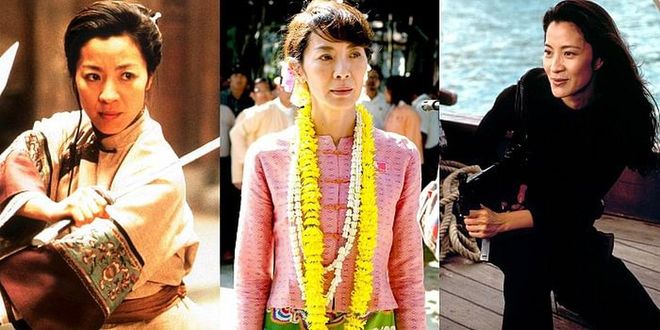
From left: Yeoh as Yu Shu Lien in Crouching Tiger, Hidden Dragon; as Aung San Suu Kyi in The Lady; as Wai Lin in Tomorrow Never Dies. Photo: Shutterstock
Crazy Rich Asians
I talk to Yeoh on opening day of Crazy Rich Asians; the movie would go on to earn $34 million within the next five days, surpassing initial estimates of a $20 million debut. “I think the most touching thing is how the people have been reacting to it, not just from Asian descent,” she says. “I think the main thing is it's such a beautiful, feel good movie. You walk out of there and go, ‘Yes!’”
Crazy Rich Asians is the first contemporary-set major studio film in 25 years to feature an almost entirely-Asian cast, following 1993's Joy Luck Club. After Asian roles in Hollywood have been whitewashed by Emma Stone and Scarlett Johansson, Crazy Rich Asians’ box office win is gratifying proof that diversity on the big screen does, indeed, sell. And it doesn’t have to be a martial arts action movie or a period piece à la Memoirs of a Geisha; it can be as simple as a "friend-next-door" rom-com, Yeoh points out.
"Don't speak about diversity and just have us there because you want to make it look like it's diverse," Yeoh says. "Meaningful representation, that's what it's all about, where the characters have real hopes and dreams and lives and it's very sincere to the culture." Below, Yeoh breaks down the process of becoming Eleanor Young, being a part of the Crazy Rich Asians movement, and her hopes for Asian representation onscreen.
Harper's BAZAAR: Eleanor is a force. How did you come to embody that character?
MY: When I read the script, I was like, "No," because unfortunately they took a more superficial run, and it's very hard because there's so many characters. How do you streamline? All the characters have their own importance and difference that makes it work as a whole. Of course as an actor, you always focus on your character and what it will bring to the whole story. Even though the story might be about the love, the young couple, and how they overcome all the difficulties, who will give them that balance? The balance is not about meanness or Eleanor just being nasty, and saying, “You are not good enough for my son.” It comes from love, it comes from her being a mother who is like a dragon mom, where they nurture and they protect their treasure. That is what Nicholas Young is. He is a gem, a pearl from the Orient that needs all the protection, and he has great responsibilities. He is supposed to take over the family business.
For me, Eleanor was very strong, and she's very self-sacrificing, but not a pushover. She stood her ground when it needs to be. She has very high standards, and when she's around, everybody knows, "Okay, if we don't meet the standards, we're gonna get a little" [motions slapping]. And I love the way we made her such that she doesn't have to raise her voice.
Related article: Your Ultimate Primer To All The ‘Crazy Rich Asians’ Characters
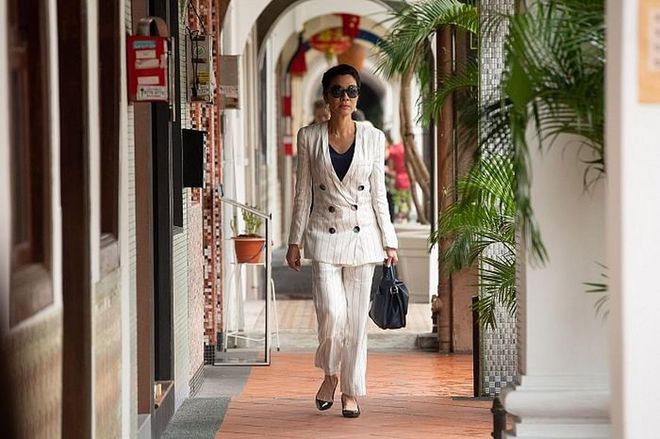
Photo: Warner Bros.
Crazy Rich Asians
HB: She has a very composed strength.
MY: But she gets her barbs from her mother-in-law, and then you realize, oh wow, [her] life is not easy. You can look at it like a gilded cage. You might have all the amazing trimmings but there's a lot of taking in deep breaths and going, “It’s okay. Bigger picture, bigger picture.” For me, she was strong in that way. So, I pushed that to Jon and I said, "What kind of a movie are we making here?" Is it going to be a Hangover kind of film? Because it can read off like that, with all the stag parties and the hen parties, and all that running around. There's nothing wrong with that because commercially it can be a huge success, but I would have felt it's such a lost opportunity not to really show what family is to the Asians, what it means to us. I think family really resonates, right?
In Asian culture, you always put your family first. But when we look at someone who is born [in the U.S.], you go, “Well, because society dictates that you're more American, you put yourself first.” You have to learn to be independent and do your thing.When you are so independent, we recognize the fact that that's how you have been brought up. That's why when Nick says to the mom, "I brought home a Chinese girl, you should be happy." But the first instinct you hear is, “Ah, she's American-born Chinese.” And that is like, “Nick, I know you need someone who needs to put you first.”
It wasn't about Rachel not being smart enough, clever enough, or being not rich enough. It's because I think Eleanor recognizes the fact that [Rachel] would not be able to sacrifice and put Nick first, before her own needs. I wanted to embody the very elegant, clever, strong women that I see around me in Asia, and I believe that is a good balance. Then, when Rachel realizes strength is also about self-sacrificing, when she said to her, “Fine, I don't wanna break up your family,” that was when Eleanor recognized, “Okay, maybe I see myself in this young lady.”
"When you are the most vulnerable, that's when you discover how strong you can be."
HB: I sympathized with Eleanor when she told Rachel that her own mother-in-law didn't think she was good enough for her son. Did you sympathize with or relate to her?
MY: I related to her because if there is no frailty, vulnerability, there's no strength as well. I think it's when you are the most vulnerable, that's when you discover how strong you can be, and how you have to use that to help yourself be stronger. She is always so regal. And that was what I wanted to show, that with strength and fierceness and all that, you don't have to raise your voice, you don't have to make loud gestures to be heard, to be felt. And I think sometimes that's more difficult. It’s easier to go, what the heck, and everybody goes, “Ah!”
HB: What was it like shooting the scene where Eleanor confronts Rachel on the stairs and tells her, “You will never be enough?”
MY: We are very close-knit set and we love watching each other perform, and everybody just went [gasps], it was so funny. Jon [Chu, the movie's director] was like, “Oh my God. Oh my God. I got goosebumps. You just killed her!”
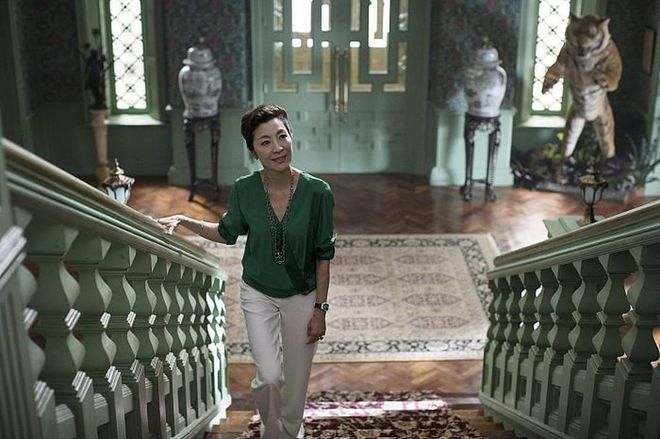
Photo: Warner Bros.
Crazy Rich Asians
HB: Did you see any similarities in these relationships with your mother or grandmother?
MY: The first scene, when you see Eleanor in her kitchen. I mean, that is her ship. That is where she is in command and she is telling them what to do. What struck me was it's so reminiscent of what it's like in my family as well, like when she says, “Oh my God, your hair is so messy” and “You look a little tired, make some soup!” That's what my mom does to me as well. A lot of Chinese parents, they don't say, “Oh I love you, I've missed you.” They'll say, “Oh you're so skinny now, you have to eat more.” Or my mom would go, if I wake up in the morning—to date—when I come out from the bathroom, she would have laid out my clothes for me. They demonstrate with their actions. And a lot of time it's with food. It's part of the makeup of our culture. It's all about getting together, having dinners, having dim sum. That's why I love that the Chinese way of eating is sharing, everything is shared. And you would get the best piece if you loved that particular person more. That's how you can tell.
HB: What was it like creating the mother-son relationship between you and Henry?
MY: We worked on that very, very hard, because like I said, when I first read the script, I realized how important this movie could be, what it means for us. But it was so flimsy at that point. So, when I Skyped with John and I told him right off, he convinced me because he comes from an immigrant family, he's first-generation, he understands all the things and he expressed how he would change the character of Eleanor—because the relationship between the son and the mother is crux—so that you feel for the son. It's like, "This is my mom and she loved me in such a way, and this is the woman that I love, why can't I have both? Why do I have to choose?" At the end of the day, if you don't feel that love between the mother and son, you won't care. If you're like, “Just up and go already man! You're gonna get the money because you're the eldest son!”, you would have not felt the conflict.
I felt that we really showed it in that scene where Nick was changing his shirt. And Henry is just so beautiful, the camera loves him, he's so charming. At first someone was saying, "Oh no, he's going to take off his shirt and you're in the scene," and I said mothers do that for their sons all the time. When we were kids, it was all the time, it never stopped. So, I said there's nothing creepy about it, and especially it's how you look at it, how you show your pride, because this is my son. And we need to talk about what he's doing with this girl, and is he serious, all these things without too big emotions, but little gestures and touches. It was very touching. I think that's probably one of my favorite scenes.
Related article: Exclusive! Jon M. Chu Talks ‘Crazy Rich Asians’ And His Favourite Spots In Singapore
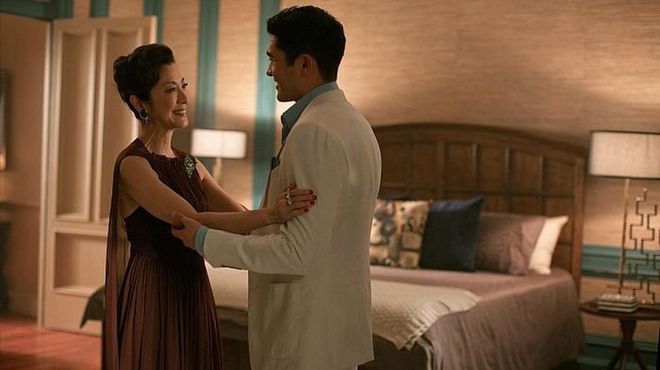
Photo: Warner Bros.
Crazy Rich Asians
This article originally appeared on Harper's BAZAAR US.